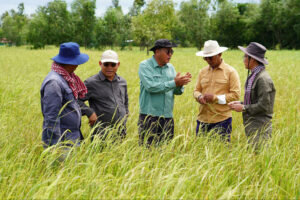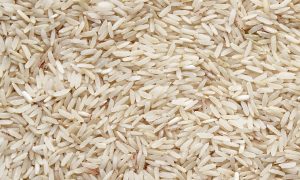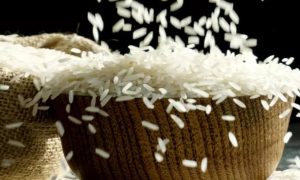Experts discuss benefits of DSR tech in rice cultivation

In Varanasi, the International Rice Research Institute (IRRI) and the World Bank held a roundtable on low methane rice at the IRRI South Asia Regional Centre (ISARC). The discussion was part of the UP-AGREES project, which focuses on scaling Direct Seeded Rice (DSR) to reduce methane emissions and promote sustainable rice farming. Stakeholders from the World Bank, Bayer, CORE Carbon X, and other organizations highlighted DSR’s benefits, including lower greenhouse gas emissions and improved water conservation. IRRI’s Yvonne Pinto and the World Bank’s Dina Umali-Deininger praised the initiative’s collaborative approach to advancing climate-smart agriculture.
Varanasi: The International Rice Research Institute (IRRI), in collaboration with the World Bank, on Thursday, hosted a roundtable discussion on low methane rice at the IRRI South Asia Regional Centre (ISARC) in Varanasi.
The event is an integral part of the broader proposed UP-AGREES project, which aims to scale up Direct Seeded Rice (DSR) to harness its potential for mitigating methane emissions and promoting sustainable rice-based food systems in the region. Prominent participants from the World Bank 2030 Water Resources Group, Bayer, CORE Carbon X, Indian Oil Corporation, PyroCCS/Teo Ventures, Reddy’s Foundation, and NARES institutes engaged in thought-provoking discussions on the multifaceted benefits of DSR, encompassing reduced greenhouse gas emissions, enhanced water conservation, and increased farm productivity.
The event also delved into the existing and potential opportunities for carbon resource management and India’s vision for the future of carbon markets.IRRI director general Yvonne Pinto expressed gratitude to the World Bank and participating stakeholders for selecting ISARC as the venue for this pivotal initiative. “DSR has been a flagship initiative of IRRI and is among our cutting-edge solutions for rice-based agrifood systems facing climatic challenges.
This roundtable marks a pivotal moment and a committed effort towards strategizing the scaling up of DSR adoption in the region.”IRRI has successfully collaborated with the World Bank on projects such as APART in Assam, the Climate Pro Project in Odisha, and the One Million Hectares of High-Quality Rice Project in Vietnam, among others, and proposed new partnerships in Kerala and Uttar Pradesh. Dina Umali-Deininger from the World Bank commended the collaborative nature of the initiative, stating,
“The partnership between IRRI and the World Bank under the UP-AGREES project is a testament to our commitment to fostering innovative solutions in agriculture. By integrating the expertise and resources of various stakeholders, we aim to create a robust ecosystem that supports the widespread adoption of climate-smart practices like DSR.” Shobha Shetty, World Bank global director for Agriculture and Food Global Practice, emphasized the potential of DSR in delivering faster planting, early maturing, and working around aerobic systems, making it a viable solution for reduced methane emissions. We also published the following articles recently
How to eat rice and chapati to get maximum benefitsAged rice and wheat offered multiple health benefits, including a lower glycemic index for better blood sugar control, increased antioxidant levels to combat oxidative stress and inflammation, and improved digestibility. Aging also enhanced flavor and concentrated essential nutrients like iron and magnesium. These benefits made aged grains a healthier choice compared to freshly harvested ones.
Palestinians killed in West Bank as world leaders try to avoid regional warEight Palestinians, including four teenagers, were killed, and seven were wounded by Israeli fire during West Bank military raids. An Israeli airstrike in southern Lebanon killed four. The conflict has escalated as leaders attempt to prevent a regional war. Humanitarian aid to Gaza is restricted due to ongoing fighting, exacerbating the crisis.
Rice water to banana peels: 5 kitchen leftovers to enhance your beautyThe article discussed how kitchen waste, such as rice water, banana peels, potato peels, cucumber peels, and yogurt, could be repurposed as natural beauty treatments. These items contain essential nutrients and enzymes that benefit skin and hair health.














